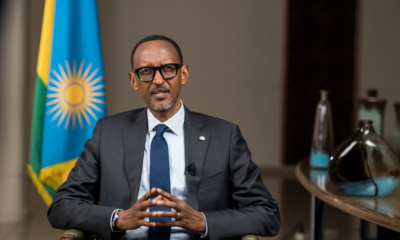Diaspora
Assessing the Impact of President Trump’s Tariff Policies
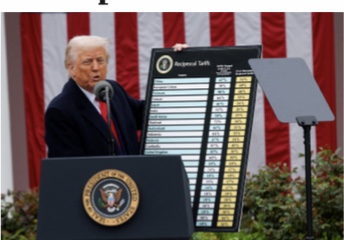
The tariff policies implemented by U.S. President Donald Trump have caused significant disruptions in global markets, leaving many businesses uncertain about how to plan for the future. Despite repeated announcements and adjustments, the overall effectiveness of these policies remains ambiguous.
From the outset of his second term, Trump aggressively pursued tariffs as a tool for trade and security leverage. Within days of taking office, he imposed 25% tariffs on most Mexican and Canadian imports, alongside a 10% tariff on Chinese goods.
The justification was twofold: curbing the flow of fentanyl and reducing undocumented immigration. However, these tariffs were soon suspended for Canada and Mexico—albeit temporarily—for 30 days in exchange for concessions related to border security and law enforcement. China, however, remained under the initial tariff burden.
In the months that followed, Trump escalated his trade war: he reinstated and raised tariffs on Canadian and Mexican goods, imposed 25% duties on steel, aluminum, and automotive imports, and doubled tariffs on Chinese goods linked to fentanyl concerns to 20%.
The administration’s approach remained erratic. Tariffs on car imports from North American neighbors were introduced, suspended, and then replaced with a sweeping 25% tariff on all global car imports.
In April, Trump introduced a “reciprocal” tariff regime, applying a 10% baseline tariff on all countries. This announcement triggered turmoil in financial markets, prompting a temporary 90-day pause—though the 10% tax remained. A more punitive 145% tariff on Chinese imports was enacted, prompting a retaliatory 125% tariff on American goods from Beijing.
Some relief followed, as the U.S. began rolling back tariffs in line with new trade agreements. A limited deal with the United Kingdom reduced the U.S. tariff on British auto imports from 27.5% to 10%, frustrating domestic automakers who now faced increased competition.
A more significant development came with the temporary truce between the U.S. and China. Both nations agreed to a 90-day pause and partial rollback, with U.S. tariffs lowered to 30% and China’s to 10%, while negotiations continued.
Even before this agreement, exceptions had been quietly made for high-demand technology products such as smartphones and computers—most of which are imported from China. The deal also reduced duties on low-value Chinese imports (valued under $800), cutting the tariff from 120% to 54%.
These low-value goods, previously exempt from import duties, were criticized for being channels for cheap goods and, allegedly, for drug trafficking—one of the original rationales for imposing tariffs.
Despite these tariff reductions, uncertainty continues to plague businesses, especially small enterprises. Such businesses, which employ nearly half of the U.S. workforce and contribute 43.5% of the country’s GDP, are especially vulnerable due to their limited resources to absorb rising costs and market instability.
This economic ambiguity is contributing to broader concerns. A Bloomberg poll cited a nearly 50% chance of a U.S. recession within the next year. Consumer confidence has plunged to a 13-year low, and inflation is projected to rise mid-year—despite a modest annual inflation rate of 2.3% in April.
Retailers are already feeling the pressure. Walmart, the largest importer of container goods into the U.S. (many from China), warned that it would need to raise prices by month’s end due to persistent tariff costs—even after recent reductions.
Trump himself acknowledged potential consumer impacts, remarking that American children might “have two dolls instead of 30,” with the remaining toys costing slightly more.
While some corporations, including Apple, have announced multi-billion-dollar investment plans in the U.S., analysts note that many of these figures include prior commitments. Thus, these announcements may reflect more about financial forecasting than actual job creation.
Overall, the Trump administration’s tariff policy has been marked by unpredictability, market volatility, and limited clarity on long-term strategy. Although some trade agreements have been reached and select investments announced, the broader economic and geopolitical gains remain uncertain.
Diaspora
Diaspora Watch Vol. 81
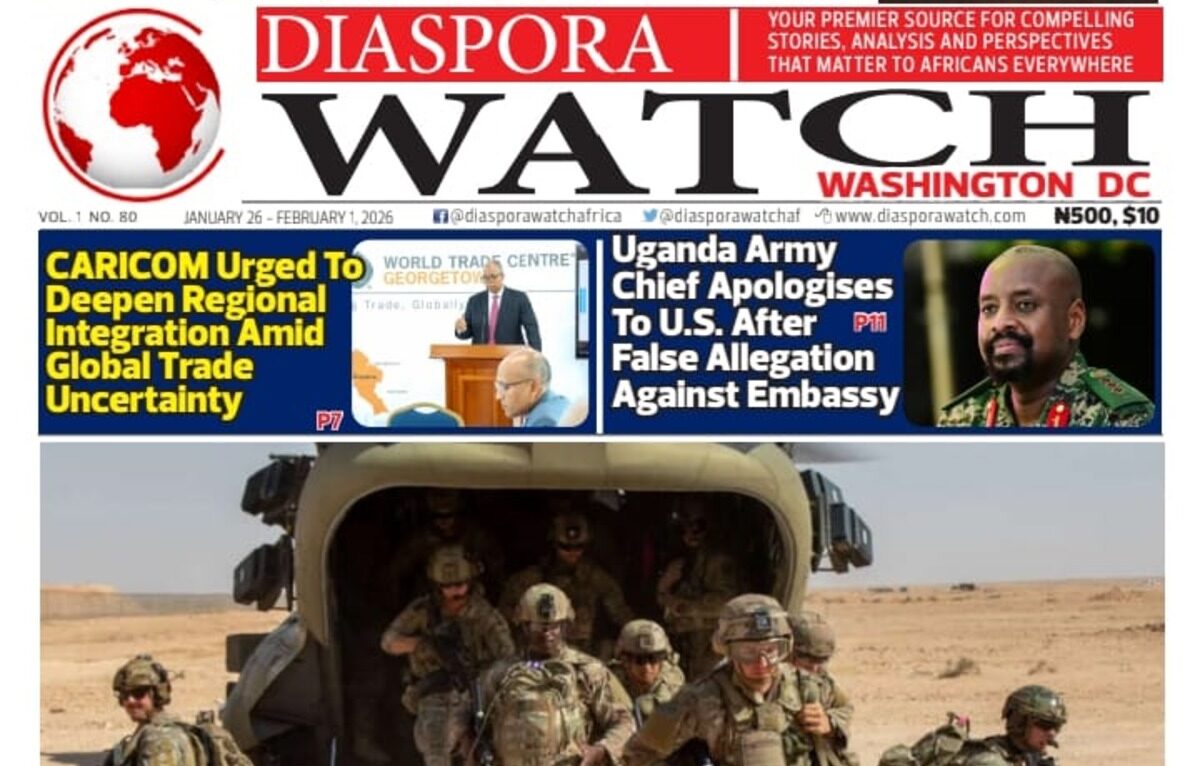
Diaspora Watch Newspaper has released its 81st edition, delivering a sharp, authoritative and globally attuned package of journalism that interrogates power, policy and influence at a critical moment in international affairs.
Diaspora Watch FREE DIGITAL VIEW: https://diasporawatch.com/3d-flip-book/diaspora-watch-vol-81/
On-Demand Print: https://www.magcloud.com/browse/issue/3259915?__r=1069759
SUBSCRIBE TO DIASPORA WATCH NOW ON THE LINK BELOW: https://diasporawatch.com/subscribe-to-diaspora-watch-newspaper/
This latest edition captures the shifting dynamics of global security, diplomacy and governance, with a lead focus on deepening U.S.–Nigeria security engagement against the backdrop of rising terror threats. The report probes the strategic calculations behind the move and what it means for regional stability, sovereignty and counter-terrorism cooperation in West Africa.
Beyond security, the edition reflects the volatility of a world in transition. From renewed uncertainty in Libya following reports surrounding Muammar Gaddafi’s son, to mounting tensions in the United States over federal immigration enforcement and public protest, Diaspora Watch situates breaking developments within their broader political and social contexts.
The newspaper also turns attention to the future, spotlighting technological innovation aimed at Africa’s digital inclusion, as well as urgent calls for stronger regional integration in the Caribbean amid global trade headwinds. Energy policy debates, evolving diplomatic relations between Africa and the United States, and the deepening humanitarian emergency in the Democratic Republic of Congo are examined with clarity, balance and depth.
Rounding out the edition is a culture-driven back-page story that blends politics, celebrity and controversy, underscoring how influence and perception increasingly intersect in the global public space.
With its 81st edition, Diaspora Watch Newspaper reinforces its position as a trusted platform for diaspora-focused journalism—bold in perspective, rigorous in reporting and committed to telling Africa’s story within a rapidly changing world.
Stay connected with the world around you – read Diaspora Watch today!
Celebrating African excellence and spotlighting pressing global issues.
#DiasporaWatch #AfricaInFocus #GlobalNews #CulturalVoices #AfricanPerspective
Diaspora
11 Killed, 14 Injured in Mass Shooting at South African Hostel
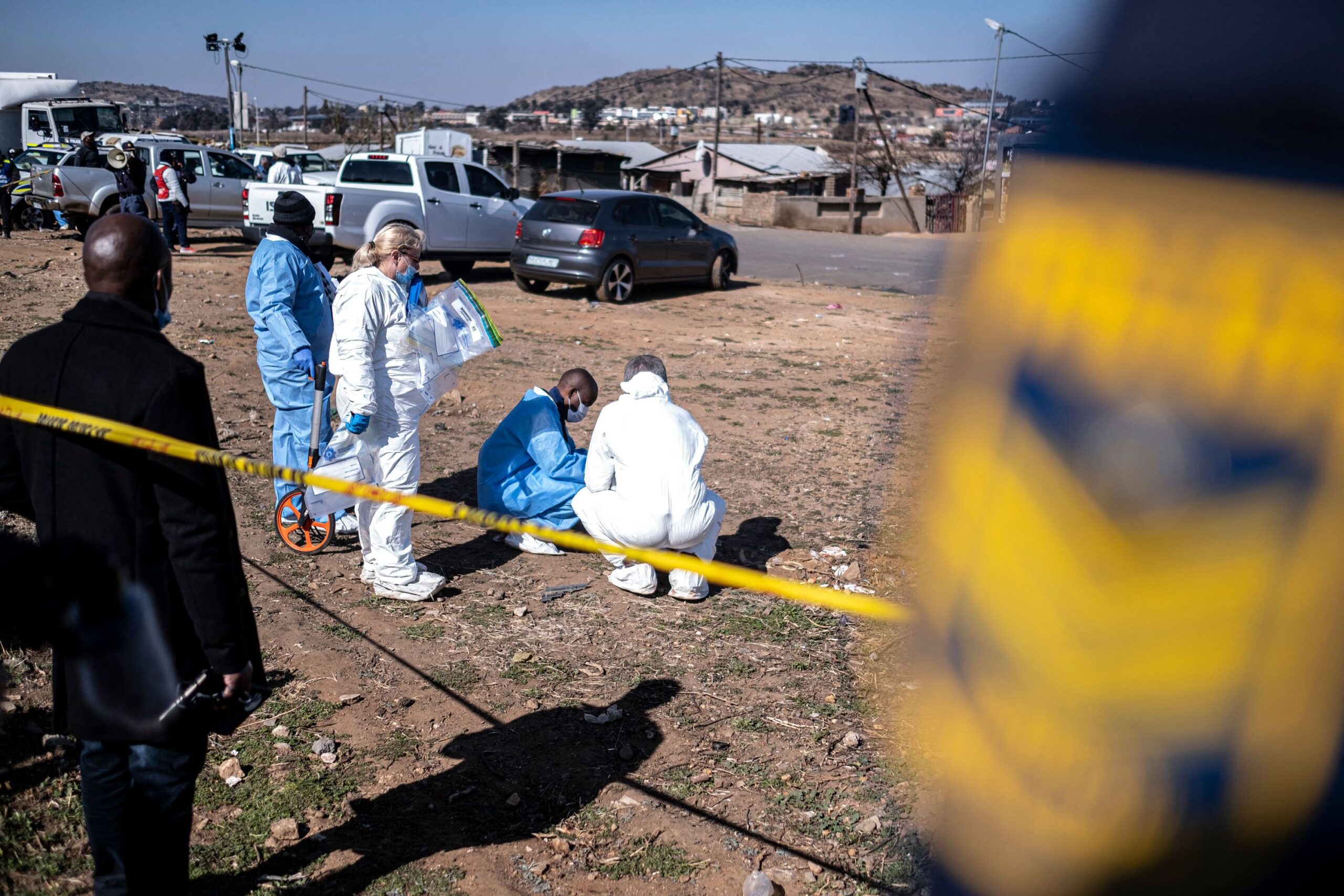
11 Killed, 14 Injured in Mass Shooting at South African Hostel
At least 11 people, including a three-year-old child, have been killed in a mass shooting at a hostel in Saulsville township, west of Pretoria, South Africa’s capital.
Police spokesperson Brigadier Athlenda Mathe said three unidentified gunmen stormed the premises around 4:30am on Saturday and fired “randomly” at a group of people who were drinking.
A 12-year-old boy and a 16-year-old girl were also among the dead.
Mathe confirmed that 25 people were shot in total, with 14 others wounded.
No arrests have been made, and the motive for the attack remains unclear.
Authorities described the venue as an “illegal shebeen,” noting that many mass shootings in the country occur in such unlicensed liquor spots.
Police shut down 12,000 illegal outlets between April and September and arrested more than 18,000 people nationwide.
South Africa continues to battle soaring violent crime.
According to UN data, the country recorded a murder rate of 45 per 100,000 people in 2023–24, while police statistics show that 63 people were killed daily between April and September.
Diaspora
Benin Foils Military Coup Attempt, 14 Arrested

Benin Foils Military Coup Attempt, 14 Arrested
The government of Benin says it has thwarted an attempted coup after a group of soldiers tried to seize power in the early hours of Sunday.
Interior Minister Alassane Seidou, in a televised address, said the armed forces “remained committed to the republic” as loyalist troops moved swiftly to suppress what he described as “a mutiny aimed at destabilising the state and its institutions.”
Earlier, the renegade soldiers, led by Lt-Col Pascal Tigri, briefly took over the national television station and announced that President Patrice Talon had been removed.
It was reported that gunfire erupted near the presidential residence in Porto-Novo, while journalists at the state broadcaster were held hostage for several hours.
A presidential adviser later confirmed that Talon was safe, dismissing rumours that he had sought refuge at the French embassy.
French diplomats also denied the reports.
Government spokesperson Wilfried Leandre Houngbedji told Reuters that 14 people had been arrested so far.
A journalist in Cotonou said 12 of those detained were involved in storming the TV station, including a previously dismissed soldier.
The attempted takeover triggered heavy security deployment across Cotonou, with helicopters hovering overhead and major roads cordoned off.
Foreign embassies, including those of France, Russia, and the United States, issued advisories urging citizens to stay indoors.
In their broadcast, the rebel soldiers accused Talon of neglecting worsening insecurity in northern Benin, where militants linked to Islamic State and al-Qaeda have carried out deadly attacks near the borders with Niger and Burkina Faso.
They also protested rising taxes, cuts to public healthcare, and alleged political repression.
President Talon, 67, who came to power in 2016 and is expected to leave office next year after his second term, has faced growing criticism over democratic backsliding, including the barring of key opposition figures and recent constitutional amendments.
Sunday’s events add to a worrying pattern of military takeovers across West Africa, with recent coups in Burkina Faso, Guinea, Mali, Niger, and, just last week, Guinea-Bissau.
Ecowas, the AU, and Nigeria have all condemned the attempted coup in Benin, calling it a threat to regional stability.
Nigeria described the failed plot as a “direct assault on democracy” and commended Benin’s security forces for protecting the constitutional order.
-
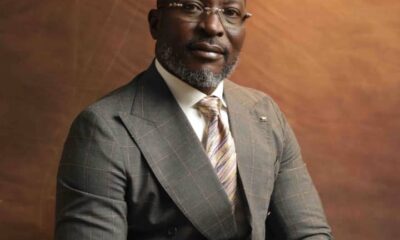
 Milestone4 days ago
Milestone4 days agoChief Chukwuma Johnbosco and the Making of a Purpose-Driven Leader
-
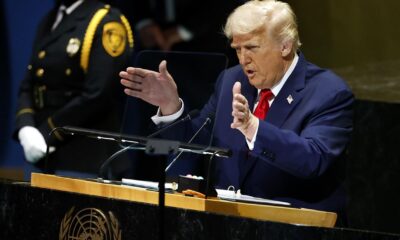
 News4 days ago
News4 days agoUS Sends Troops to Nigeria Over Rising Terror Threats
-

 Sports5 days ago
Sports5 days agoEx-Sri Lanka Star Jayasuriya Named in USA Squad for T20 World Cup
-

 Sports5 days ago
Sports5 days agoLens Edge Le Havre to Reclaim Ligue 1 Top Spot
-

 Sports5 days ago
Sports5 days agoJustin Rose Sets 36-Hole Record, Opens Four-Shot Lead at Torrey Pines
-
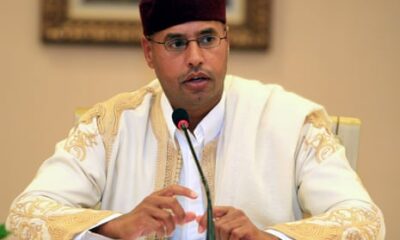
 News4 days ago
News4 days agoMuammar Gaddafi’s Son, Saif al-Islam, Reportedly Shot Dead in Libya






